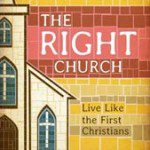 In our contemporary context, it is hard to imagine a word more frequently tossed around to arouse our passions than the word “freedom.” I have to admit that my suspicions are raised immediately when I see some new congressional legislation with the word “freedom” in it or when I hear a public official affirm that some action is being undertaken to honor or expand our freedoms. Too often, the term is coopted and deployed in a very Orwellian way so that if one takes the time to dig into the legislation or claims being made, one frequently finds the meaning to be quite the opposite of the normal sense. Whenever someone aims to promote a particular agenda, he or she often tries to find a way to frame the agenda as a “freedom” issue by appealing to our fundamental American value of freedom in the sense of liberty to choose.
In our contemporary context, it is hard to imagine a word more frequently tossed around to arouse our passions than the word “freedom.” I have to admit that my suspicions are raised immediately when I see some new congressional legislation with the word “freedom” in it or when I hear a public official affirm that some action is being undertaken to honor or expand our freedoms. Too often, the term is coopted and deployed in a very Orwellian way so that if one takes the time to dig into the legislation or claims being made, one frequently finds the meaning to be quite the opposite of the normal sense. Whenever someone aims to promote a particular agenda, he or she often tries to find a way to frame the agenda as a “freedom” issue by appealing to our fundamental American value of freedom in the sense of liberty to choose.
And, why not? Does not our existence as a people itself rest in the very appeal to the notion of freedoms and liberties? The founding documents of the United States of America speak of certain “unalienable rights” and goes on to say these include “liberty and the pursuit of happiness.” The desire for freedom, or the right to be the “captain of our own souls” and to choose whatever actions we wish, perhaps extends beyond the American tradition and runs deep in the human soul. It does particularly so in the contemporary west. I affirm that the right to exercise our freedom of choice is an important and good thing, yet I also have to ask whether or not this particular sense of freedom has the highest priority within the biblical narrative. Is it really the case, in other words, that God’s biggest concern, when it comes to human freedom, is to make sure that we all are free to do as we please? I think the answer to that question is no. In fact, the Western notion of freedom, while in general a good thing, is more a product of Enlightenment individualism on the one hand and the political philosophy of John Locke on the other. Biblically speaking, anytime the Scriptures use the phrase “and each person did as was right in their own eyes” it is uniformly a bad thing….
I had the good fortune to spend a term at the University of Munich studying under systematic theologian Wolfhart Pannenberg. My focus was on his doctrine of God. In review of his writings, some critics argued that Pannenberg’s theology left little room for human freedom. While I disagreed with that view, I felt the need to question him about it. As I became more pointed in my questioning, I recall a moment where he sat up straight in his chair and pointed a finger in my direction. He said, “Mr. Gutenson, we as Christians should not be primarily concerned with the notion of freedom as the ability to choose between options. No, we as Christians should be first concerned with a much more biblical notion of freedom, freedom in the sense of freedom from sin!” He went on to talk about how Augustine had written of the paradox of freedom. The paradox, he said, was that as persons become more conformed to the image of Christ, they actually find the range of choices they might actually make becoming smaller. Freedom for Christians, he said, increasingly meant liberty from choosing sinful behaviors. In the midst of a world that has made “personal freedom” the ultimate good, Pannenberg sent me back to the early church for a better grasp of what it meant to be free.
Read more from Chuck Gutenson and his new book The Right Church at the Patheos Book Club.













